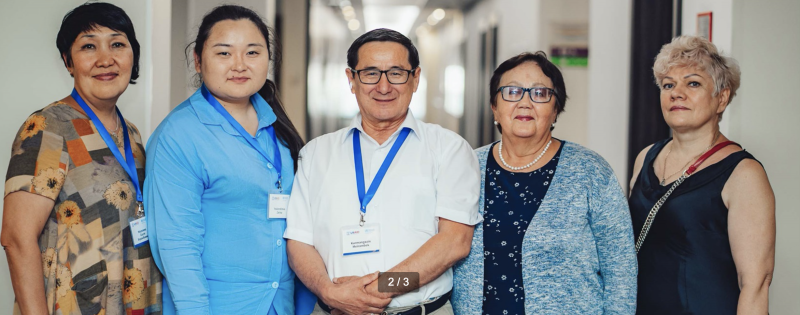
Health workers build confidence in COVID-19 vaccination in Kazakhstan
March 2, 2023
European Region
Kazakhstan
How to discuss COVID-19 vaccination and build communication skills with patients was at the heart of a series of workshops in 4 regions of Kazakhstan. Over 200 health workers attended the training, while more than 4000 participated online, including paediatricians, obstetricians, gynaecologists, infectious disease specialists, epidemiologists, and medical professors. This training for building communication skills was the first of its kind in Kazakhstan.
“In the training, Kazakh health workers learned new strategies to support their patients in making informed decisions about their health. In Kazakhstan, trust in local doctors is quite high, which makes them perfect agents of change for better health,” explains Dr Manar Smagul, a national instructor and Deputy Director at the national Scientific and Practical Centre for Sanitary and Epidemiological Examination and Monitoring of the Ministry of Healthcare of Kazakhstan.
“These trainings make it much easier for health workers to talk with patients about the importance of COVID-19 vaccination, because they provide them with a structured approach to doctor-patient conversations, saving them time,” explains Dr Ramazan Abylkassov, a paediatrician and consultant in the WHO Country Office in Kazakhstan, who helped plan the trainings together with the national partner organization, the Scientific and Practical Centre for Sanitary and Epidemiological Examination and Monitoring.
The series of workshops was made possible thanks to 3 previously held sessions during which the Ministry of Healthcare, in collaboration with the WHO Country Office in Kazakhstan, prepared 65 national instructors to pass on their newly gained knowledge to colleagues and peers. These certified trainers, including members of the Ministry of Healthcare, went on to develop the training plan for the series of workshops that has now been completed.
Health workers as vaccine advocates
“What I liked most about these trainings was the keen interest of health workers in the counselling methodology, which included practicing the motivational interviewing skills that we taught them, using scenarios and role play,” says Dr Artyom Gil, a WHO consultant who participated in the initial sessions and then helped facilitate the series of training workshops.
During the sessions, health workers learn how to build trust in COVID-19 vaccination by practicing evidence-based communication techniques, including how to start a dialogue, explore people’s concerns, share knowledge and expert information, and summarize a conversation. Prior to initiating this so-called conversation pathway, health workers also use the WHO COVID-19 Vaccination Patient Communication Algorithm, which helps them determine where the patient is on the vaccine acceptance continuum.
Health workers are generally the most trusted advisors and influencers of vaccine decisions, so it is critical to equip them with knowledge and skills to promote acceptance of COVID-19 vaccination and effectively address questions and concerns raised by the public. WHO’s comprehensive training and resource package, which includes the Algorithm and evidence-based communication techniques, has already been used to support this goal in 13 countries in the WHO European Region, including Kazakhstan.
Vaccine acceptance and demand beyond COVID-19
Dr Abylkassov believes that the training content has much broader potential because health workers can apply the skills learned to other vaccines. Even if the vaccine in question changes, the skills used to encourage vaccine acceptance remain the same. “The longer-term goal is to incorporate this training material into the academic curricula for medical schools in Kazakhstan,” he notes.
Planning is underway to engage with academic institutions in building the communication capacity of medical undergraduate students to ensure they are well prepared to address concerns about vaccines and vaccination upon entering the health care workforce.
Partnering with the European Union
These health worker training activities are part of a €10 million project co-financed by the European Union and implemented by WHO/Europe in 2022–2026. The project aims to create a more resilient health system in 5 countries in central Asia: Kazakhstan, Kyrgyzstan, Tajikistan, Turkmenistan and Uzbekistan.
Launched in October 2022, the project is initially focusing on scaling-up COVID-19 vaccination, developing and implementing COVID-19 and routine immunization plans, training health workers and professionals involved in vaccination, and strengthening immunization information systems. The project will also build up vaccine-preventable disease surveillance and the use of digital solutions to prevent and respond to future vaccine-preventable disease outbreaks.
Please click here to read the original article